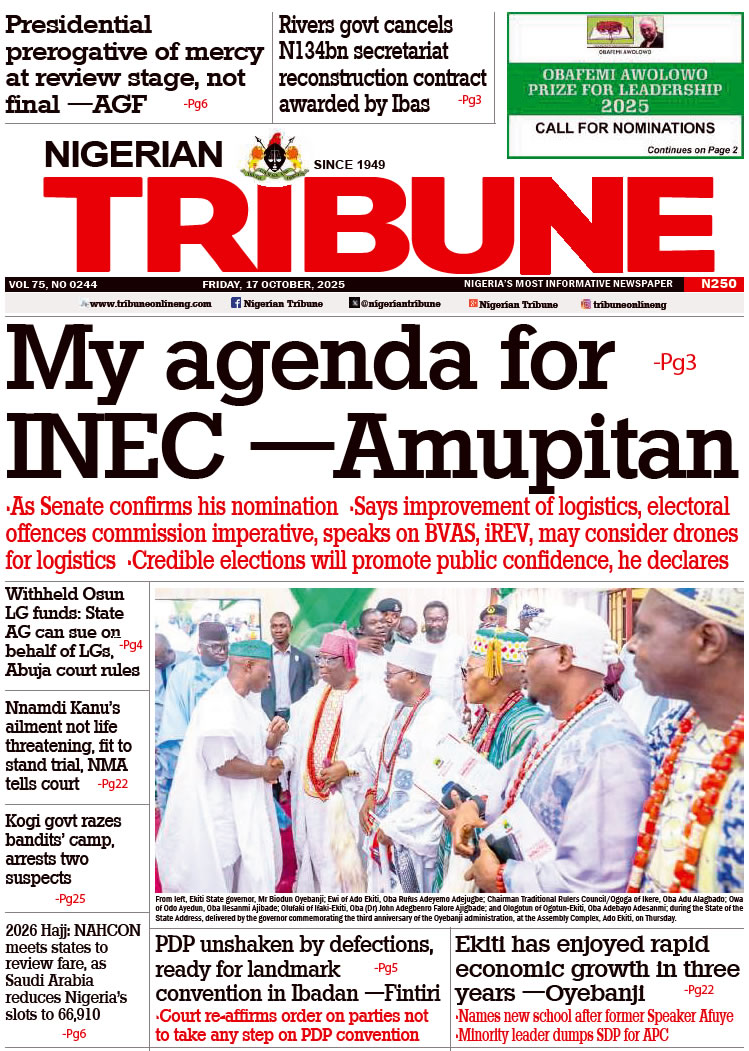An Associate professor in Theatre Arts, Dr. Kola Oyewo is a Nigerian actor, dramatist, and scholar and was born some 74 years ago at Oba Ile, a town in Osun State. The veteran actor shared with FEMI OGUNTAYO in this interview, his experience as an old student as well as how the film village created by the late chief Ogunde went into extinction and other issues. Excerpts:
As an actor, a veteran at that, and a lecturer in the university, how has the Coronavirus pandemic affected you and how have you been coping?
The pandemic has affected every phase of life, some two weeks to the lockdown, my university, where I lecture said we should be teaching online, which we have been doing. So, since 14th of April, we have been teaching online. Now we are preparing also for an online examination, but in terms of production, you know it is not a thing that can be done online, we have to come together. I have not been able to go to movie locations also, because before the lockdown, I was ill and I had to return some of the advance I collected for some productions while I was in the hospital, but I thank God that I am okay now.
You have done a lot of stage plays; in fact you now train students in stage plays. What is the significance of stage plays to screenplays and do you think our present day stars should also venture into stage plays?
I started with stage plays, I started with the Oyin Adejobi theatre group in Osogbo, where we performed on stage and later performed on the television. Later I came to Ife, where I had the opportunity to study Theatre Arts and became a lecturer. So, I considered the stage as training ground, which is why you will see that anyone who has been trained on the stage will be good at any other type of production. If you have noticed, those of us who started from the stage, you can see how distinct our own acting has been compared to those who did not have the opportunity to train on stage. Compare those who studied Theater Arts, like Taiwo Ibikunle and the likes. There is no one who studied Theater Arts that won’t have stage experience. Some of them have also been going to study drama and attend training schools, which is good. So, they will see that their attitude to act has changed since they had that opportunity.
Some people still appreciate movies done in your time more than some of the movies we have now in the market, what do you think is wrong with present day Nollywood? How would you rate them?
Every profession has its past, present and the future. What obtains during our own time is different from what obtains now because we didn’t have the same opportunity which they have now. I started when there was no video and digital production, when the optical emerged and my first one was ‘Orun n Moru’. Nowadays, nobody can produce optical films, because it is too expensive and the type of equipments they use for videos now is so sophisticated that there is clarity with video and audio merging very well. So, modern technology has helped a lot.
So, would you say Nollywood is developing at the right pace?
Yes, it is developing. The only thing about it is funding because if our people have more funding, they would perform far better. In some cases, they have to make movies with what they can find, when they can find it, they will just say, let us manage it like that. Like Tunde Kelani said, when Ogunnde first film, he was working with some Brazillians, Tunde Kelani joined them to work to gain more experience. So, he told me a story when we were at a movie location for ‘Ko see gbe’ in 1995. He said, if they say a particular object is needed or they are short of a particular material, Baba Ogunde would ask, how much is it sold? How many of this thing are we going to need? If you tell him we can still manage this two, he would say don’t manage the two, here is money, go and buy six. You see? That was why Ogunde’s films at that time was unique because he made funds available for every object that was needed, not a case of managing or making use of what you can get.
Movies like Kurunmi, Afonja, Efunsetan Aniwura and the likes are historical movies which give the viewers a glimpse into what happened in the past and how it actually happened, what is your take on producing more historical movies in Nollywood?
They are very expensive to produce because there are some locations you will have to create yourself. The reason for that is that, structures like that do not exist anymore and Baba Ogunde tried then, because he had a film village in Ososa, near Ijebu Ode, where he did his first, second and third productions. But when the man died, nobody cared about the place and it has been taken over by weed. In fact, if you go there now, you won’t know anything of such was there before. If the government, maybe Ogun State government or Federal Government could take over the place and develop it, that could have been our Hollywood or Disneyland. If you go to America, there is a place called ‘Hollywood’, but our own Nollywood, there is no place to point to and say, take me to Nollywood in Nigeria. Where would you point to? Is it Lalupon? So it has been of great disadvantage that nobody took over that film village.
How have you been combining acting with lecturing?
Well, the two are related because I teach what I practice, and I practice what I teach. It is not a case of teaching let’s say, economics, and dabbling into theatre arts. The experience I garner at film locations, I bring to teach my students in class and the books I have read and the method I have taught in class, I make use of in film locations. So, the two complement each other. That is why it has been easy for me.
When you started acting, did it occur to you that you would further your education and become a lecturer?
It never occurred to me. Like I said, I started with Oyin Adejobi films, later I relocated to Ife and joined the University of Ife in 1973. It was later I decided to further my education, having been in the university for so long and I said, why don’t I grab this opportunity and educate myself? That was when I decided to study for my first degree. During that time, I was in the same class with my second son – Adeyemi and we both graduated in 1995. I was 49 years old then, when my age mates were already professors (laughs).
How did you feel being in the same class with your son?
It was all fun because we were studying the same thing, we acted on stage together and it was all fun.
Is there any funny experience from that period that you would like to share with us?
Yes, I remember one day; it was the beginning of the semester. I asked Yemi (my son) to go and copy the timetable from the notice board and he copied the wrong thing. So, the lecture that was supposed to start 9am, we were strolling into the class at 10 minutes to 10, thinking we had 10 minutes to settle down, whereas it was 10 munites to the end of the class. The lecturer, Dr. Uji just said, “Ahah, are you coming from a family meeting?” and all our classmates started laughing. I just said, Yemi see what you have caused now? So many experiences like that during that period, but thank God it all came out well.
Having trained students in theatre arts, what would you say is the future of the acting profesion or Nollywood in Nigeria?
The future of acting in Nigeria is bright; the only issue is that the lazy ones will be out of job. The lazy ones who do not want to improve on their knowledge will be out of job because nobody will call them when they have those that have been trained and are ready to work.
Reminiscing on the past now, what is your best moment so far?
My best moments were time I had to travel to the United States of America in company with the University of Ife Theatre group (now, Obafemi Awolowo University Theatre Group), with the likes of Wole Soyinka in 1982 for a performance. Also I was invited to London in 2002 to receive an award; it was called Afro-Hollywood awards. I went in company with so many other actors in the industry. We enjoyed ourselves for like three weeks and we came back home.
What about some embarrassing moments you would like to share with us?
Yes, there are so many embarrassing moments, but the most embarrassing moments of them all were times one would be confronted by area boys all around. In places like Ikorodu roundabout, even in Lalupon village in Ibadan, they will come to movie locations to harass us, saying we have to drop something or ‘settle them’. Even in Ilorin too, they disturb us and so many other places.
YOU SHOULD NOT MISS THESE HEADLINES FROM NIGERIAN TRIBUNE
BREAKING: APC Caretaker Committee In Closed-Door Meeting With Tinubu
Members of All Progressives Congress (APC) Caretaker Committee led by Governor of Yobe State, Mai Mala Buni on Thursday visited Lagos State and are currently holding a closed-door meeting with Asiwaju Bola Ahmed Tinubu, who is the National Leader of APC… Read Full Story
BREAKING: PDP Dissolves South-West Zonal Caretaker Committee, Names New Team
The National Working Committee (NWC) of the Peoples Democratic Party (PDP) has dissolved the South-West Zonal Caretaker Committee of the party and announced a new caretaker committee… Read Full Story
Buni Holds Closed-Door Meeting With Akande In Osun
The national chairman, All Progressives Congress (APC) national caretaker committee, Ma Mala Buni, who is also the governor of Yobe, on Thursday held a closed-door meeting with the former interim national chairman of the party, Chief Bisi Akande… Read Full Story
Post COVID-19 Economy: Nigerians Must Embrace Taxation For Survival ―Lagos Finance Commissioner
Lagos State Commissioner for Finance, Dr Rabiu Olowo, has called on Nigerians to embrace taxation as the most potent way out of COVID-19 consequence, contending that crude oil had never been a reliable source of financing a country of Nigeria’s magnitude and diversity… Read Full Story
Post COVID-19 Economy: Nigerians Must Embrace Taxation For Survival ―Lagos Finance Commissioner
Lagos State Commissioner for Finance, Dr Rabiu Olowo, has called on Nigerians to embrace taxation as the most potent way out of COVID-19 consequence, contending that crude oil had never been a reliable source of financing a country of Nigeria’s magnitude and diversity… Read Full Story
Buhari Appoints More Ambassadors To Correct Imbalance
President Muhammadu Buhari has approved the renewal of the appointments of 12 non-career ambassadors in a move to address complaints about the recent appointments of 41 non-career ambassadors… Read Full Story
FG Converts All Govt Hospitals In FCT To COVID-19 Sample Collection Centre
The Federal Government has converted all the government hospitals in FCT, Abuja, to COVID-19 sample collection sites, the Minister of Health, Dr Osagie Ehanire, said on Thursday at the briefing of the Presidential Task Force on COVID-19… Read Full Story
AFDB, WTO, Others Seek Measures To Support Trade Finance In Developing Nations
The African Development Bank (AFDB), the World Trade Organisation (WTO) and other financial institutions (MDBs) are collaborating to support trade finance in developing nations in a bid to alleviate the impact of COVID-19 on their economy… Read Full Story
$1bn Cloned Account: We Welcome House Of Reps Investigations ― NPA
Following a motion of urgent national importance and the consequent resolution of the House of Representatives to investigate an alleged secret account operated by the Nigerian Ports Authority (NPA) with Unity Bank plc during plenary on Thursday, the management of the Authority reiterated the non-existence of… Read Full Story
Petrol Price Hike, Imposition Of Hardship On Nigerians ― PDP
Opposition Peoples Democratic Party, (PDP) has described the new petrol price hike from N123 to N143.80 as the imposition of hardship on Nigerians by the ruling All Progressives Congress… Read Full Story
EDITORIAL: The Collapse Of Public Waterworks
IT is more than a truism that in Nigeria, there is water everywhere, but very little to drink. The country is so richly endowed with water resources that a number of its 36 states have aquatic names: examples include Delta, Cross River, Rivers, Benue, Osun, Ogun and Niger. The country has 215 cubic kilometres of available… Read Full Story
WATCH TOP VIDEOS FROM NIGERIAN TRIBUNE TV
- Relationship Hangout: Public vs Private Proposals – Which Truly Wins in Love?
- “No” Is a Complete Sentence: Why You Should Stop Feeling Guilty
- Relationship Hangout: Friendship Talk 2025 – How to Be a Good Friend & Big Questions on Friendship
- Police Overpower Armed Robbers in Ibadan After Fierce Struggle






